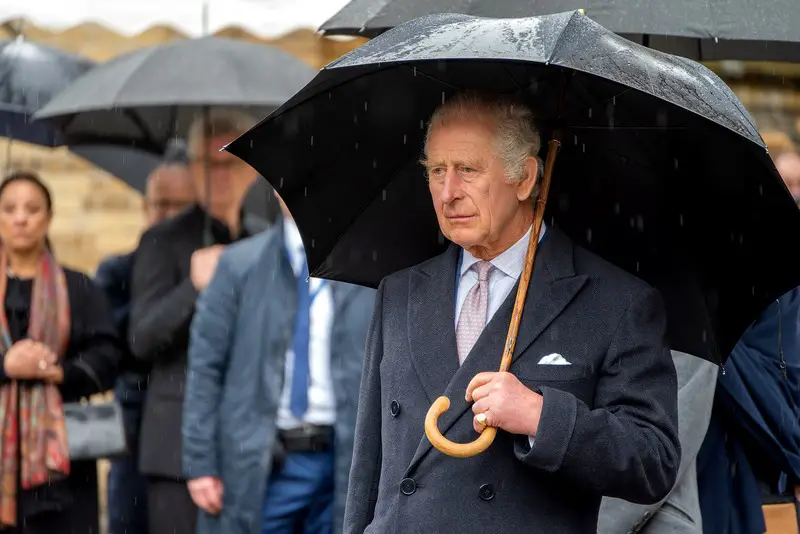King Charles III has been urged to reduce his royal workload after the 76-year-old monarch was briefly hospitalized due to temporary side effects from his ongoing cancer treatment. While Buckingham Palace downplayed the health scare as a mere “bump in the road,” the incident prompted the cancellation of all royal engagements scheduled for the following day.
Royal experts and commentators are now encouraging the ailing King to consider scaling back his duties, particularly the less engaging aspects of his role. This advice comes as Charles continues to battle cancer, a diagnosis he received in early 2024 following treatment for an enlarged prostate.
“The trouble is, he’s been so conditioned to work that I don’t think he functions unless he’s working,” royal author Ingrid Seward told Newsweek. “When he’s not working, he’s probably a bit all over the place, I know I’m like that. He’s always working and it’s just not his nature to take an afternoon nap, which I’m sure Camilla is trying to make him do.”
The monarch’s work ethic has been a longstanding characteristic, with Queen Camilla reportedly being the only person who has had some success in persuading him to take things easier. Despite his health challenges, Charles has maintained a busy schedule of public engagements since his diagnosis, only reducing his workload when medically necessary.
Seward, author of the royal book “My Mother and I,” suggested that the most viable approach would be to allow the King to continue with the more stimulating aspects of his official duties while delegating the more routine tasks to other senior royals.
“Cancer treatment makes you very, very tired,” she explained. “The trouble is it’s his duty as monarch to do these stifling boring handshakes with incoming and outgoing ambassadors.”
Despite the recent setback, King Charles defiantly returned to public duties on Tuesday, marking his first official engagement since his hospitalization at the London Clinic. The monarch appeared in good spirits as he conducted an investiture ceremony at Windsor Castle, where he bestowed honors on several individuals.
The King’s swift return to work signals that his overall health is improving, according to royal observers. “He’s always been driven and he’s strong,” Seward noted. “This cancer has weakened him but I think he’s fine.”
As Charles continues his gradual return to public-facing duties, the palace has indicated that he is scheduled to make up for the “unspecified appointments” missed last week. His upcoming engagements include several events celebrating Papua New Guinea’s 50th anniversary of independence and a public engagement supporting an aviation charity.
The King is also expected to conclude his week with his regular audience with British Prime Minister Keir Starmer, a key aspect of his constitutional role as monarch.
Charles and his medical team are currently drafting a health-conscious schedule to ensure that he and Queen Camilla can proceed with their planned visit to Italy next week. This significant trip will coincide with the royal couple’s 20th wedding anniversary, which falls on April 9.
The King and Queen were also scheduled to visit Pope Francis at the Vatican during their Italian tour. However, they were forced to reschedule their meeting with His Holiness following the Pope’s own lengthy hospitalization last month.
Since his cancer diagnosis was revealed in February 2024, King Charles has taken a notably different approach to health communication compared to previous monarchs. While he has not disclosed the specific type of cancer he is battling, he has been relatively open about his treatment journey, a significant departure from the more private approach taken during Queen Elizabeth II’s reign.
Cancer charities have praised this transparency, noting that by not specifying the type of cancer, the King has avoided prioritizing one form of the disease over others while still raising awareness about cancer treatment and recovery.
Throughout his treatment, which is expected to continue into 2025, Charles has remained determined not to let his illness define him. Despite medical advice to postpone public-facing duties during the initial stages of his treatment, he continued to undertake state business and official paperwork.
In October 2024, the King even paused his cancer treatments during an 11-day royal tour of Australia and Samoa, demonstrating his commitment to fulfilling his role as monarch and head of the Commonwealth.
Royal observers have noted that maintaining his work provides the King with purpose during his recovery. However, the recent hospital visit serves as a reminder that he continues to face challenges from his ongoing treatment.
As the monarch navigates his health journey while fulfilling his royal responsibilities, the balance between duty and recovery remains delicate. While Charles has shown remarkable resilience, the advice from royal experts suggests that some adjustment to his workload might be necessary to protect his long-term health.
The palace continues to provide reassurance about the King’s condition, emphasizing that his recovery is progressing positively despite occasional setbacks related to his treatment.











